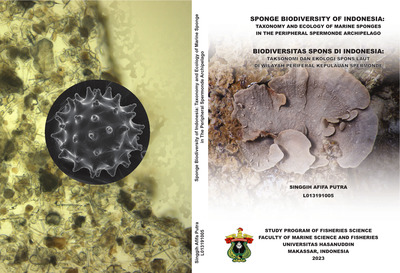Putra, Singgih Afifa (2023) Biodiversitas Spons di Indonesia: Taksonomi dan Ekologi Spons Laut di Wilayah Periferal Kepulauan Spermonde = Sponge Biodiversity of Indonesia: Taxonomy and Ecology of Marine Sponges in The Peripheral Spermonde Archipelago. Disertasi thesis, Universitas Hasanuddin.
![[thumbnail of Cover]](/36235/1.hassmallThumbnailVersion/L013191005_disertasi_13-02-2024%20cover1.png)

L013191005_disertasi_13-02-2024 cover1.png
Download (5MB) | Preview
L013191005_disertasi_13-02-2024 1-2.pdf
Download (10MB)
L013191005_disertasi_13-02-2024 dp.pdf
Download (426kB)
L013191005_disertasi_13-02-2024.pdf
Restricted to Repository staff only until 20 August 2026.
Download (18MB)
Abstract (Abstrak)
Background. The global marine ecosystem harbors a vast array of undiscovered life forms, with estimates suggesting that a significant portion remains unidentified. The estimation of marine species, particularly sponge diversity in Indonesia, is acknowledged as underrepresented, emphasizing the importance of expanding research efforts. Although historical expeditions and international collaborations have contributed to understanding sponge diversity, taxonomic information gaps persist. Aims. The general objectives of this dissertation are to fill information gaps in sponge biodiversity, provide a comprehensive checklist of sponge species for the marine ecoregions of Indonesia, understand the roles of sponges in coral reef ecosystems, and evaluate sponges as sentinels for the study of microplastic pollution. Specific objectives include taxonomic and systematic analyses of sponges, identification of functional morphology, ecological relationships, and analysis of micropollutant incorporation in tropical reef sponges over space and time. Methods. Various observation and analytical methods were employed in this dissertation's research. In general, sponge specimens were collected and observed from the shallow waters of the Spermonde Archipelago, specifically between intertidal and subtidal zones, from 2018 to 2022. However, for the micropollutant study, samples were collected since 1997. Taxonomic and systematic studies on Indonesian sponges relied on references and datasets validated by the World Porifera Database, covering the period from 1820 to 2021. Field observations utilized roving techniques, with each specimen documented in situ, preserved in ethanol, and analyzed in the laboratory. Micromorphological analyses used light microscopy (LM), and for specific species, scanning electron microscopy (SEM) was also applied. Micropollutant analysis of sponge specimens employed visual techniques with microscopy (LM and SEM) and Foton scattering analysis using Raman spectroscopy. Results. This dissertation presented a comprehensive taxonomic and systematic understanding of Porifera in Indonesia, identifying 27 marine sponge species from the peripheral zone of the Spermonde Archipelago, predominantly from the Order Haplosclerida. The sponge species checklist for the marine ecoregions of Indonesia documented a total of 735 species, with significant regional endemism, revealing insufficient data in several marine ecoregions. On the other hand, the analysis of macro-morphological classification of sponges (Demospongiae) from 24 species showcased diverse morphologies, demonstrating the adaptability of these animals to various habitats and diverse environmental conditions. Furthermore, the analysis of micropollutants in several sponges revealed varied particle contents that could be accumulated by tropical reef sponges, with positive temporal variations and spatial factors closely related to urban areas. Conclusions. This dissertation uncovered the overlooked diversity of Porifera in the marine ecoregions of Indonesia, particularly in the coral reef ecosystems of the Spermonde Archipelago, emphasizing information on the diversity and important ecological roles of sponges in tropical marine ecosystems. The applicability of the morphological classification system was also demonstrated in this dissertation. Furthermore, this dissertation proposed some sponge species as sentinels or repositories related to the study of marine environmental pollution, particularly microplastics.
Keywords : checklist, coral reef, marine pollution, growth forms, Porifera
| Item Type: | Thesis (Disertasi) |
|---|---|
| Uncontrolled Keywords: | bentuk pertumbuhan, daftar periksa, polusi laut, Porifera, terumbu karang |
| Subjects: | Q Science > Q Science (General) |
| Divisions (Program Studi): | Fakultas Ilmu Kelautan dan Perikanan > Ilmu Perikanan |
| Depositing User: | S.Sos Rasman - |
| Date Deposited: | 02 Sep 2024 05:25 |
| Last Modified: | 02 Sep 2024 05:25 |
| URI: | http://repository.unhas.ac.id:443/id/eprint/36235 |


